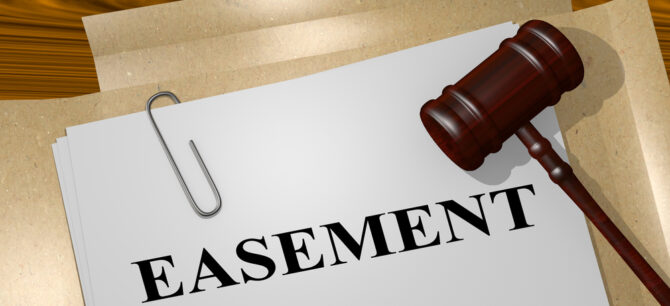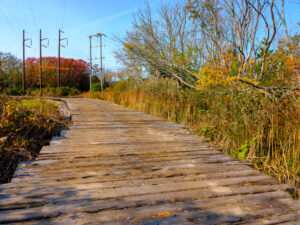Florida Easement Liabilities

Florida premises liability laws say a landowner may be held responsible if a person suffers an injury on their property due to the owner’s negligence. But who is liable for an accident on an easement, where someone other than the property owner has certain rights and obligations?
Cases involving easement liabilities can be challenging because easements can be granted to several different parties. If you sustained a personal injury on an easement, an experienced premises liability attorney can identify the party(s) responsible for compensating you.
However, not all accidents that occur on easements are valid premises liability claims. Reach out to attorneys at Chiumento Law, PLLC for advice. Our knowledgeable legal team can investigate your case and give you an honest opinion about whether you have a case. We will help develop a strategic plan to pursue the compensation you deserve if you do. Call or contact us today for a free consultation with a skilled Florida premises liability lawyer.
Legal Definition of an Easement
An easement is essentially a right to access or enjoy someone else’s property without owning the land. For example, if two people live on neighboring properties, but one landowner must use a private road that runs through the other person’s property to access their home, an easement would legally permit them to do so.
The party with the right to use the easement is called the dominant estate, while the party who owns the underlying property is known as the servient estate. In a nonexclusive easement, the servient landowner can still make use of an easement as long as they don’t impose upon the dominant estate’s rights to the easement.
Florida Law on Easement Liability
Florida law is not clear on the issue of liability if there is no express agreement between the dominant and servient estates. While tradition dictates that the dominant estate is responsible for maintaining the easement and ensuring it is free from hazards, state law is ambiguous about whether the underlying property owner or both owners can be held accountable in a premises liability case.
Because Florida statutes don’t provide property and easement owners with any real direction on navigating liability issues, many have turned to previous court cases for guidance.
Collom v. Holton
A footnote in Collom v. Holton, a 1984 case heard in Florida’s Second District Court of Appeal, established judicial precedent on the issue of liability when a third party sustains injuries on an easement.
In the first footnote in Collom v. Holton, the court established that the dominant estate ― the person granted access to use an easement ― is responsible for maintaining the property’s safety. However, there are exceptions to this rule. If they expressly agreed to maintain and control the easement, the servient owner could be responsible for eliminating safety hazards on the property. The servient owner could also be responsible if they voluntarily took it upon themselves to maintain the property for third-party visitors.
Zipkin v. Rubin Construction Co.
In Zipkin v. Rubin Construction Co., a 1982 civil case heard in Florida’s Fourth District Court of Appeal, a worker died after a construction accident on an easement road. The servient owner of the easement argued that he was not liable for the incident, but the court disagreed.
The court reasoned that because the servient owner used the easement road himself and allowed other individuals to use it, he still exercised some authority over the easement. They determined that even if servient landowners were subject to an easement, they could still be held liable if that easement was nonexclusive ― in other words, if the servient landowners were permitted to use the property. Under an exclusive easement, the underlying property owner would not be allowed to use the property and therefore couldn’t be held liable for any third-party injuries.
It’s important to note that this ruling is somewhat at odds with the footnote in Collom v. Holton, which held that liability for a nonexclusive easement lay with the dominant estate. Every case is unique, and even the smallest factual difference can result in different decisions by the courts.
Alternative Situations
In the average premises liability case, landowners owe differing degrees of care to individuals on an easement. The injured third party’s legal status on the property plays an integral role in determining the landowner’s responsibility.
- Trespassers ― Trespassers are individuals who have entered a property illegally. Easement owners generally owe the lowest level of care to trespassers. In Florida, property owners only have to refrain from deliberately injuring them.
- Uninvited licensees ― A licensee is someone who enters a property for their own benefit, such as a salesperson or, in the case of Zipkin v. Rubin Construction Co., a truck driver. Property owners owe a higher level of care to licensees. In addition to refraining from deliberately harming licensees, landowners must not intentionally endanger licensees and must warn them about known hazards on a property.
- Invitees ― Invitees are individuals who have been invited onto a property by the landowner. Landowners owe invitees the highest level of protection. They must keep the property reasonably safe for invited guests and warn them of any hidden dangers.
While liability generally focuses on the level of authority that dominant and servient owners have over an easement, the relationship between the injured third party and each owner can still impact liability.
Who Can Be Held Liable?
Several parties can be held liable for an injury that occurs on an easement. However, determining who you could or should bring a claim against can be tricky. Various parties could have access to the easement, including:
- Neighboring property owners
- Private corporations
- Utility companies
- Nonprofit organizations
- Government entities
In a typical premises liability claim, you would hold the property owner liable for any injuries you suffered. But when the injury occurs on an easement, the liable party could be the dominant owner, the servient owner, or another entity altogether. An attorney can help identify whether the easement is exclusive or nonexclusive and the parties with authority over it.
Once you determine who is liable for an accident on the easement, you must establish that the party’s negligence led to your injuries and losses. Clear and compelling evidence must prove that the liable party(s) had a duty to remove potential safety hazards on the easement, and their failure to perform that duty caused your injury and losses.
Contact Our Experienced Premises Liability Attorneys in Florida
Did you suffer a personal injury on an easement? Are you unsure of who is at fault? The premises liability lawyers at Chiumento Law, PLLC are prepared to investigate the matter thoroughly, collect evidence to establish liability, document and calculate your total losses, and seek the settlement you deserve. Contact us today for a free consultation.
